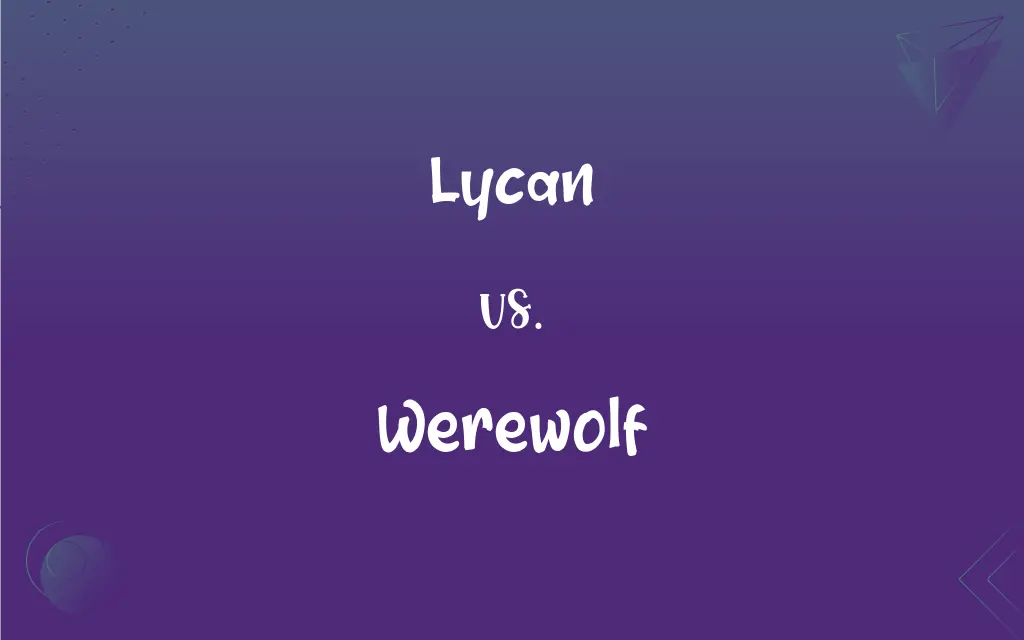Lycan vs. Werewolf: What's the Difference?
Edited by Janet White || By Harlon Moss || Updated on May 30, 2024
Lycan and werewolf both reference creatures that can shift between human and wolf forms, though lycans are often seen as retaining more human-like attributes in wolf form in modern fiction.

Key Differences
In many mythological and fictional contexts, both lycans and werewolves have common elements, yet distinctions often arise primarily through the specific details of their respective transformations and physical characteristics. Notably, lycans tend to possess the ability to transform at will, maintaining a semblance of their human consciousness even in beast form. On the other hand, werewolves traditionally transform, frequently unwillingly, under the full moon, often losing their human mind in the process.
The realm of physical attributes provides a distinct bifurcation point between lycans and werewolves. Typically, lycans in various stories and films are depicted as large, powerful creatures that bear a hybridization of human and wolf features. In contrast, werewolves are often shown as essentially wolves during their transformation, lacking the anthropomorphic traits seen in lycans.
When exploring the control and consciousness during transformation, lycans are often portrayed with a greater ability to control their actions and maintain a semblance of human reasoning and thought. In the flip side, werewolves are frequently shown as being subject to a total loss of their human cognitive abilities, acting predominantly on animalistic instincts and drives when in their wolf form.
Origin stories and methods of becoming a lycan or werewolf introduce further divergences between these two creatures. Werewolves are traditionally created through a bite or scratch from another werewolf, or sometimes through a curse. Lycans, depending on the fictional universe, might be born into their condition or cursed, exhibiting the abilities from a young age, sometimes with a genetic component implied.
Culturally and historically, lycans and werewolves have been leveraged as metaphors and allegories in various works of literature and film. While werewolves have a longer and more widespread mythology throughout numerous cultures, reflecting fears of loss of control and the beast within, lycans have been utilized more in recent media to explore nuanced topics of dual identity, oppression, and social outcasting.
ADVERTISEMENT
Comparison Chart
Etymology
Derived from “Lycanthrope”, Greek in origin
Originated from Old English "wer" (man) and "wulf" (wolf)
Syllable Count
Two syllables: Ly-can
Two syllables: Were-wolf
Usage
Primarily used in modern fictional contexts
Used in both historical myths and modern fiction
Plural Form
Lycans
Werewolves
Associated Myth
Often associated with consistent self-willed transformation
Associated with involuntary transformation during a full moon
ADVERTISEMENT
Lycan and Werewolf Definitions
Lycan
A lycan is a mythological creature that can transition between human and wolf.
The lycan swiftly navigated through the woods, adept in both human and wolf form.
Werewolf
A werewolf is a being that morphs between human and wolf, commonly under the full moon.
The townsfolk prepared for chaos, knowing the werewolf would appear that night.
Lycan
Lycans are sometimes portrayed as retaining a level of human intellect in their wolf form.
Even as a wolf, the lycan devised a plan, showcasing rational thinking.
Werewolf
Werewolves typically embody a total physical transformation into a wolf.
Unlike lycans, the werewolf didn’t maintain a humanoid stature in its lupine form.
Lycan
In popular culture, a lycan often exhibits substantial control over its transformation.
Unlike werewolves, the lycan could choose when to embrace its wolfish side.
Werewolf
Werewolves often lack control over their transformation and actions in wolf form.
Once a werewolf, his human conscience was eclipsed by a primal mentality.
Lycan
Lycans may embody physical characteristics reflecting both their human and wolf forms.
The lycan stood upright, a towering figure with both human and lupine features.
Werewolf
The werewolf myth has permeated various cultures, embodying fears of unbridled savagery.
Across Europe, tales of the werewolf served as cautionary metaphors for unchecked rage.
Lycan
The term "lycan" originates from the term "lycanthrope", referring to a human-wolf shifter.
In folklore studies, the lycan is dissected as a symbol of duality and inner struggle.
Werewolf
Traditionally, becoming a werewolf often involves a curse or transmission via bite.
After being bitten, he dreaded the inevitable transformation into a werewolf.
Lycan
(literary) A werewolf.
Werewolf
A person believed to have been transformed into a wolf or to be capable of assuming the form of a wolf.
Werewolf
(mythology) A person who is transformed or can transform into a wolf or a wolflike human, often said to transform during a full moon. Category:en:Horror
Werewolf
A person transformed into a wolf in form and appetite, either temporarily or permanently, whether by supernatural influences, by witchcraft, or voluntarily; a lycanthrope. Belief in werewolves, formerly general, is not now extinct.
The werwolf went about his prey.
The brutes that wear our form and face,The werewolves of the human race.
Werewolf
A monster able to change appearance from human to wolf
FAQs
How does a werewolf traditionally transform?
Werewolves are typically portrayed as transforming from human to wolf during a full moon, often losing their human consciousness and becoming purely instinctual creatures.
Can a lycan control its transformation?
In most modern portrayals, lycans have the ability to control their transformations, choosing when and how they change between human and wolf forms.
Are lycans and werewolves considered the same in all cultures?
No, the specifics can vary widely between cultures and storytelling traditions, often presenting divergent characteristics, origins, and weaknesses for these creatures.
Is there a cure for being a werewolf?
Mythologies and stories vary; some suggest possible cures, like various potions or breaking a curse, while others portray lycanthropy as irreversible.
What is a werewolf's appearance during transformation?
A werewolf typically takes the form of a wolf or a humanoid wolf-like creature, with specific appearances varying across different narratives.
Can a human become a werewolf by being bitten by another werewolf?
In many myths and stories, a human can become a werewolf if bitten, with the first transformation often occurring during the next full moon.
Are werewolves always portrayed as violent?
Often, but not always. Werewolves are frequently depicted as predatory and uncontrollable, but portrayals can vary, with some presenting more sympathetic or nuanced characters.
Do lycans live in packs?
Depending on the story, lycans might live solitarily or form packs, with some narratives highlighting complex social structures and hierarchies within lycan communities.
Do lycans have special powers?
In various fictional portrayals, lycans may have enhanced strength, speed, agility, and regenerative abilities, but exact powers can vary between stories.
How are werewolves typically killed in mythology and fiction?
Werewolves are often depicted as being vulnerable to silver weapons and can be killed with a silver bullet or blade in many tales.
Is there historical belief in lycans?
While the term "lycan" and its particular attributes are more modern, belief in human-wolf transformation has historical roots, such as in ancient Greek accounts of lycanthropy.
Can werewolves communicate with wolves?
In some tales and portrayals, werewolves are depicted as having an ability to communicate or establish dominance over regular wolves.
What is a lycan?
A lycan is a mythical creature often depicted as having the ability to transform between human and wolf forms at will, commonly maintaining some human features and consciousness in wolf form.
How do lycans transform in most modern portrayals?
Lycans typically transform at will, their change often depicted as a relatively quick and sometimes painful process, but with a degree of control and intentionality.
Do lycans and werewolves appear in global mythologies?
Yes, while the specific details and characteristics vary, stories of humans transforming into animals, including wolves, appear in numerous global cultures and mythologies.
Can werewolves remember their actions after transforming back?
This varies by portrayal; some stories present werewolves as having no memory of their actions while transformed, while others may allow for partial or full recollection.
Are lycans susceptible to traditional werewolf vulnerabilities, like silver?
This can depend on the specific story or mythology; some may share common werewolf vulnerabilities, while others present lycans with distinct characteristics and weaknesses.
Are werewolves and lycans considered evil?
Moral alignments can vary; some narratives present them as tragic figures, others as brutal beasts, and some explore their humanity, revealing a spectrum from malevolent to benevolent characters.
Can werewolves transform outside of a full moon?
Traditional myths usually link werewolf transformations to the full moon, but different stories may introduce variations or additional triggers.
Are lycans associated with other supernatural creatures?
Yes, in some mythologies and fiction, lycans interact with or exist alongside other supernatural entities, such as vampires, witches, or other shape-shifters.
About Author
Written by
Harlon MossHarlon is a seasoned quality moderator and accomplished content writer for Difference Wiki. An alumnus of the prestigious University of California, he earned his degree in Computer Science. Leveraging his academic background, Harlon brings a meticulous and informed perspective to his work, ensuring content accuracy and excellence.
Edited by
Janet WhiteJanet White has been an esteemed writer and blogger for Difference Wiki. Holding a Master's degree in Science and Medical Journalism from the prestigious Boston University, she has consistently demonstrated her expertise and passion for her field. When she's not immersed in her work, Janet relishes her time exercising, delving into a good book, and cherishing moments with friends and family.































































